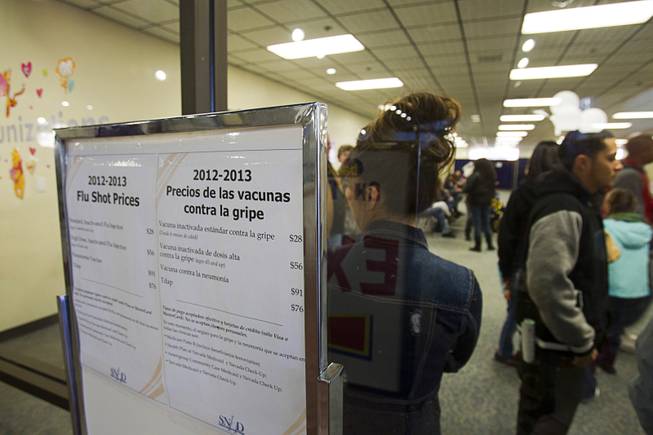
People wait for flu shots and other vaccinations at the Southern Nevada Health District’s immunization clinic, 330 S. Valley View Blvd. at Meadows Lane, Monday, January 14, 2013.
Tuesday, Jan. 7, 2014 | 9:20 a.m.
The first flu-related deaths of the season have been reported in Clark County, the Southern Nevada Health District said today.
In a news release, the Health District said the flu-related deaths involved two middle-aged individuals and one elderly person. The Health District did not identify the deceased.
The district said influenza activity is on the rise in Southern Nevada and urged people to be vigilant in their fight to ward off the virus.
“These deaths serve as a stark reminder of what a serious illness flu can be and the importance of taking preventive measures, such as getting a flu vaccination every year, to protect yourself and your family,” Dr. Joe Iser, chief health officer of the Southern Nevada Health District, said in the statement.
Every year seasonal flu causes substantial illness and death in the United States, much of which could be prevented with vaccination and other preventive measures.
The Health District recommends that everyone 6 months of age and older get a yearly flu vaccination. Those at high risk of complications from the flu include children younger than 5 (children younger than 2 years old are at highest risk), adults 65 years of age and older, and pregnant women.
In addition annual flu vaccines, the Health District offered other steps to help stop the spread of germs and prevent respiratory illnesses like the flu.
• Avoid close contact with people who are sick. When you are sick, keep your distance from others to protect them from getting sick too.
• If possible, stay home from work, school, and errands when you are sick. You will help prevent others from catching your illness.
• Cover your mouth and nose with a tissue when coughing or sneezing. It may prevent those around you from getting sick.
• Washing your hands often will help protect you from germs. If soap and water are not available, use an alcohol-based hand rub.
• Avoid touching your eyes, nose or, mouth. Germs are often spread when a person touches something that is contaminated with germs and then touches his or her eyes, nose, or mouth.
• Practice other good health habits. Clean and disinfect frequently touched surfaces at home, work, or school, especially when someone is ill. Get plenty of sleep, be physically active, manage your stress, drink plenty of fluids, and eat nutritious food.
For information about the health district’s flu vaccine clinics call (702) 759-0850 or visitwww.SNHD.info.

Join the Discussion:
Check this out for a full explanation of our conversion to the LiveFyre commenting system and instructions on how to sign up for an account.
Full comments policy